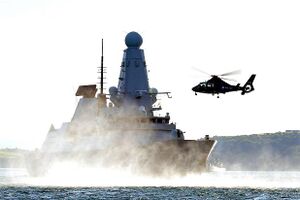UnNews:Latest Royal Navy vessels sunk in hot water
| Every time you think, you weaken the nation —Moe Howard | ✪ | UnNews | ✪ | Wednesday, February 18, 2026, 16:05:59 (UTC) |
| Latest Royal Navy vessels sunk in hot water | 
|
25 July 2016
PLYMOUTH, England -- The Royal Navy’s newest warships keep breaking down in the Persian Gulf, because they were not designed for operating while in “hot water,” First Sea Lord Admiral Sir Philip Bentley-Harrods has told the House of Commons Defense Committee.
The Committee was informed that the “innovative” gas turbine engines, powering the six £1 billion Type 45 destroyers, “degraded catastrophically” in warm seas causing shortages of electrical power, although the engines themselves operate at peak performance when running at several hundred degrees Celsius.
Despite a multi-million pound refit, in an attempt to rectify the inability to provide a tray of ice for oysters and steer the ship at the same time, he conceded the Royal Navy had accepted that it would not be able to go to sea “much of the time in any place, and on very few days of the year.”
Last year’s Strategic Defence and Security Review allocated £280 million to improve the performance of the type 45 WR21 gas turbine engines, to take some of the strain of secondary electrical systems such as guns, radars and rudders, to prevent power cuts to essential services such as wine cooling and floodlighting the hangar for formal cocktail parties, the committee heard.
The Admiral told the Parliamentary Ministers: “The MoD will be funding the modifications to Type 45s. Contractually, from the original position, all liabilities and warranties are not connected to the modification package that is now being designed. Assuming the sea temperature in the Gulf was similar to Plymouth Sound in July, has been a bit of a misjudgement on our part, so we will cover the cost (through the tax payer), and have created three more Admiral posts to oversee proceedings from their various Oxfordshire country estates.”
A representative of engine manufacturer Rolls-Royce told the committee last month that: “the conditions in the Gulf were far more arduous than the specifications detailed by the MoD in its contract. You would think that the Royal Navy would know how hot it is in the Middle East — they have been going there since 1809 — but to be fair, perhaps we should have Googled it ourselves before firing up the workshop.”
The Admiral also told the committee that: “...the WR21 gas turbines were designed in extreme hot weather conditions to ‘gracefully degrade’, like a female sub-lieutenant discovering the merits of subsidised Special Vat cider, until you get to the point where it goes beyond the temperature at which it would function. In this scenario, you could bring systems offline and gradually adjust the way the ship is operating.
“For example, in the English Channel for a couple of weeks in the spring and autumn, the vessels are fully operational. In the eastern Mediterranean, we would lose the Sea Wolf missiles and the bridge coffee machine. Transiting the Gulf of Oman, we would need to go adrift for two hours to make ice for the Pimms at “Sundowners”, and transiting the Strait of Hormuz between Kumzar and Bandar Abbass, would be by torchlight and requires three or four tugs. We found the resilience of the diesel generators and WR21s wasn’t degrading gracefully, it was degrading catastrophically, so when it comes time for the Officer’s Wardroom to open, the vessel just blacks-out completely.”
The First Sea Lord added that work to improve the reliability of the WR21s was largely complete, but to be fully operational, holes would have to be cut into the sides of the ships to fit larger diesel generators, causing them to sink. However, he assured Parlaiment that despite the difficulties, the destroyers continue to be deployed in the Persian Gulf and Red Sea and were generally performing well at anchor.
Admiral Bentley-Harrods concluded by pointing out that in reality, to design a warship that can operate in all conditions and all times of the year in all places, like the profit-making merchant navy, would be extremely poor value-for-money, considering warships can’t fight in the desert anyway. However, the latest tweaks will give resilience into these ships, meaning they will be able to provide entertainment for coalition Flag Officers, go forward and steer effectively from here on in, during weekday working hours in the winter months.
Sources[edit]
- WMNA Greenwood "Duff destroyers leave MoD with £280m bill". Plymouth Herald, July 20, 2016
